The document discusses functional programming and its paradigms, focusing on Java's implementation of lambdas and streams. It explains key concepts such as external and internal iteration, lambda functions, functional interfaces, and stream operations. The workshop aims to teach Java developers how to utilize these features for productive programming.
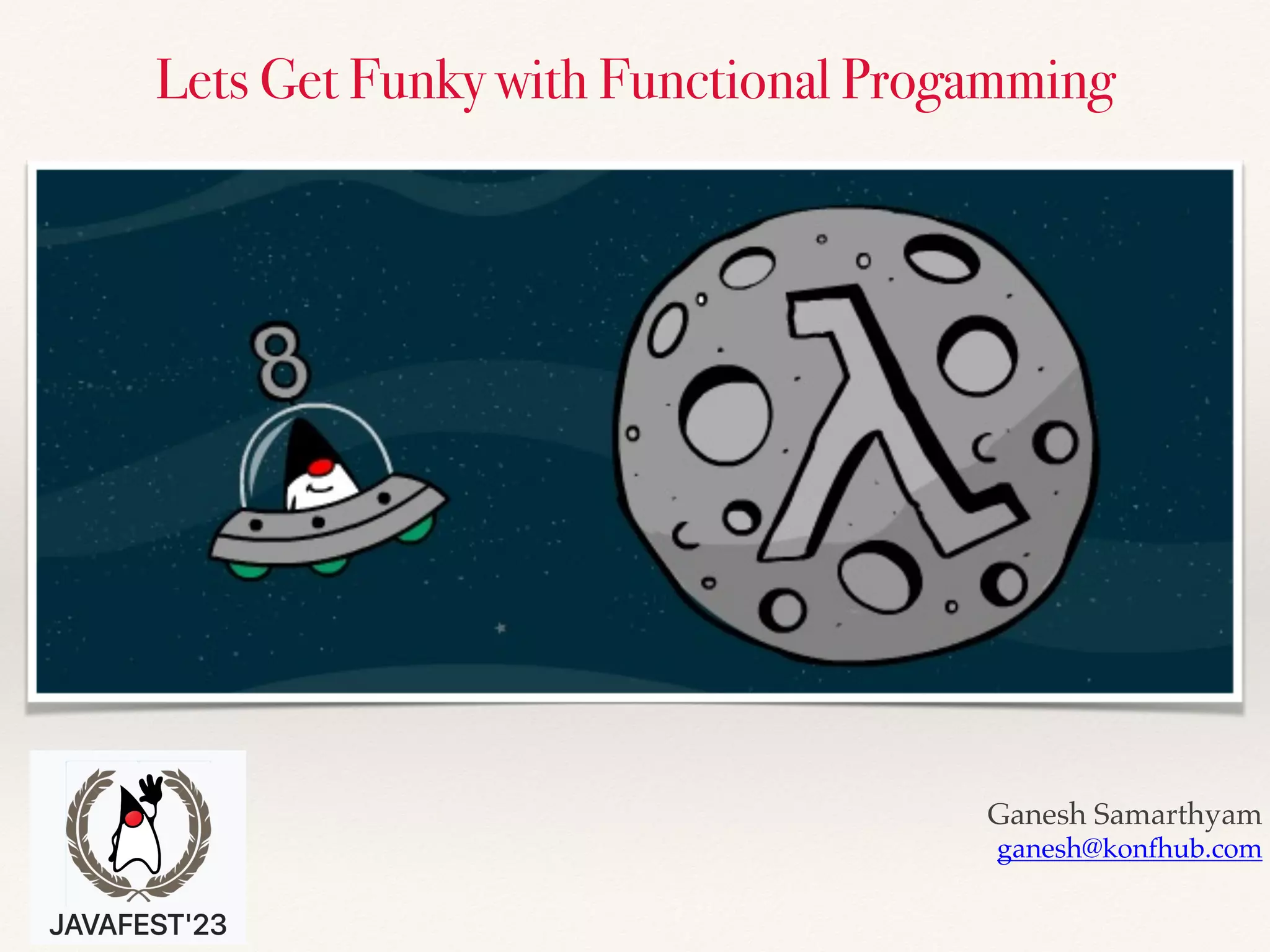
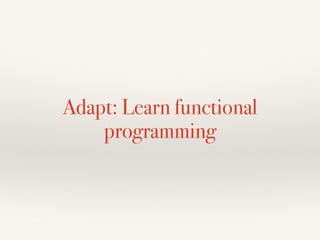
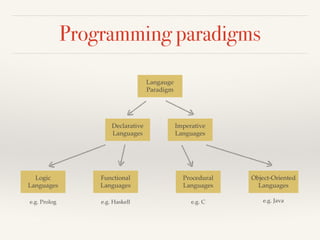

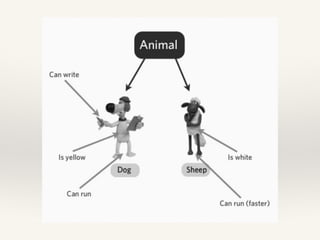

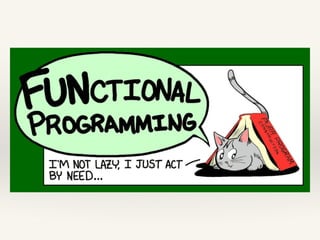
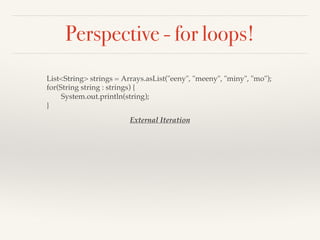
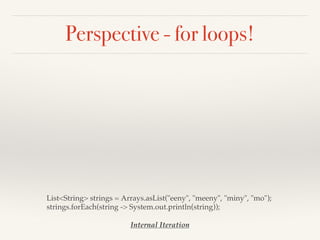
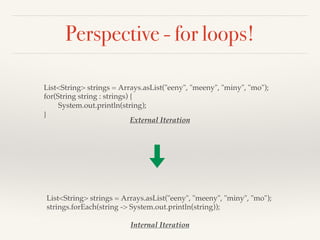
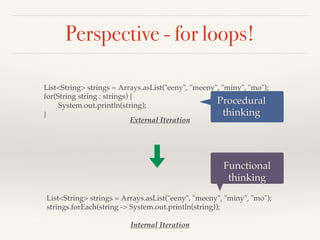
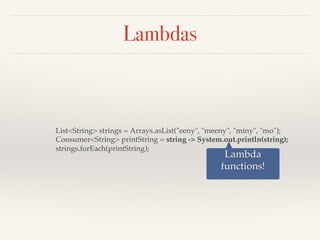
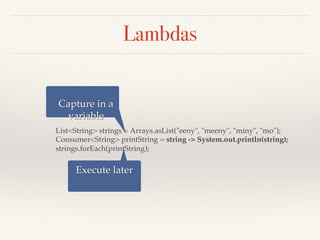
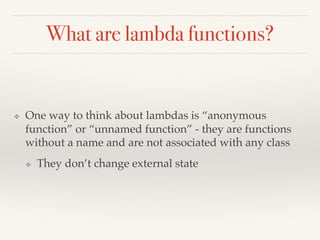
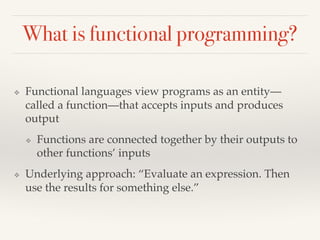
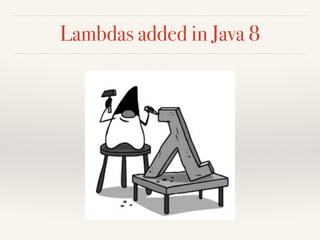
![Productive programming with lambdas
import java.io.*;
class Type {
public static void main(String []files) {
// process each file passed as argument
for(String file : files) {
// try opening the file with FileReader
try (FileReader inputFile = new FileReader(file)) {
int ch = 0;
while( (ch = inputFile.read()) != -1) {
// ch is of type int - convert it back to char
System.out.print( (char)ch );
}
} catch (FileNotFoundException fnfe) {
System.err.printf("Cannot open the given file %s ", file);
}
catch(IOException ioe) {
System.err.printf("Error when processing file %s; skipping it", file);
}
// try-with-resources will automatically release FileReader object
}
}
}
args.each { println new File(it).getText() }](https://image.slidesharecdn.com/functionalthinking-ganesh-230717025137-8a6d2d6d/85/Functional-Thinking-for-Java-Developers-presented-in-Javafest-Bengaluru-17-320.jpg)
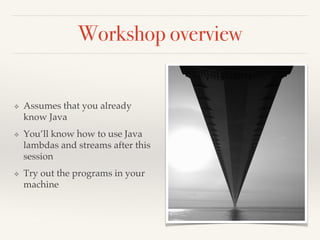
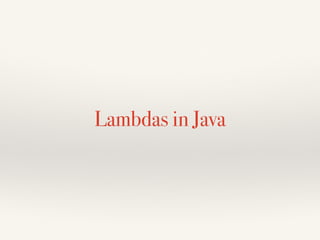
![Java lambdas - “Hello world!”
interface LambdaFunction {
void call();
}
class FirstLambda {
public static void main(String []args) {
LambdaFunction lambdaFunction = () -> System.out.println("Hello world");
lambdaFunction.call();
}
}](https://image.slidesharecdn.com/functionalthinking-ganesh-230717025137-8a6d2d6d/85/Functional-Thinking-for-Java-Developers-presented-in-Javafest-Bengaluru-20-320.jpg)
![Java lambdas - “Hello world!”
interface LambdaFunction {
void call();
}
class FirstLambda {
public static void main(String []args) {
LambdaFunction lambdaFunction = () -> System.out.println("Hello world");
lambdaFunction.call();
}
}
Functional interface - provides
signature for lambda functions
Lambda function/expression
Call to the lambda
Prints “Hello world” on the console when executed](https://image.slidesharecdn.com/functionalthinking-ganesh-230717025137-8a6d2d6d/85/Functional-Thinking-for-Java-Developers-presented-in-Javafest-Bengaluru-21-320.jpg)
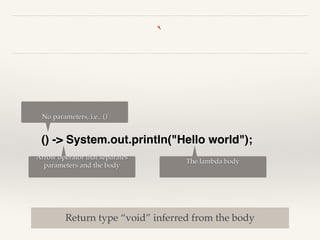
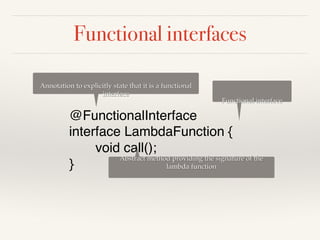
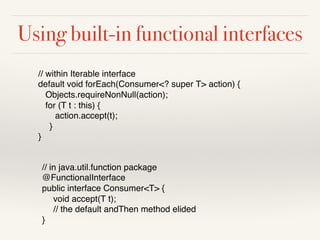
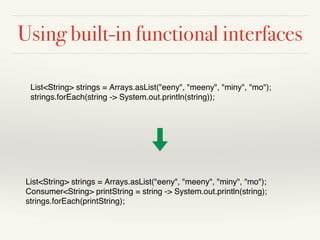
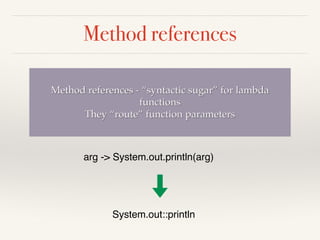
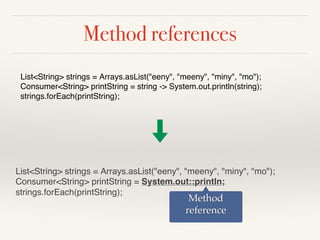
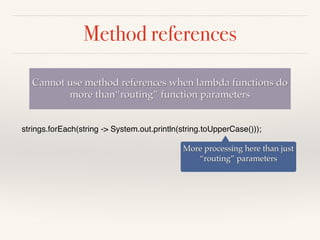
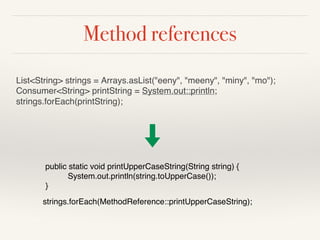
![“Effectively final” variables
import java.util.Arrays;
import java.util.List;
class PigLatin {
public static void main(String []args) {
String suffix = "ay";
List<String> strings = Arrays.asList("one", "two", "three", "four");
strings.forEach(string -> System.out.println(string + suffix));
}
}
Accessing “local variable” suffix
here; hence it is considered
“effectively final”](https://image.slidesharecdn.com/functionalthinking-ganesh-230717025137-8a6d2d6d/85/Functional-Thinking-for-Java-Developers-presented-in-Javafest-Bengaluru-30-320.jpg)
![“Effectively final” variables
import java.util.Arrays;
import java.util.List;
class PigLatin {
public static void main(String []args) {
String suffix = "ay";
List<String> strings = Arrays.asList("one", "two", "three", “four");
suffix = "e"; // assign to suffix variable
strings.forEach(string -> System.out.println(string + suffix));
}
}
PigLatinAssign.java:9: error: local variables referenced from a
lambda expression must be final or effectively final
strings.forEach(string -> System.out.println(string + suffix));
^
1 error](https://image.slidesharecdn.com/functionalthinking-ganesh-230717025137-8a6d2d6d/85/Functional-Thinking-for-Java-Developers-presented-in-Javafest-Bengaluru-31-320.jpg)

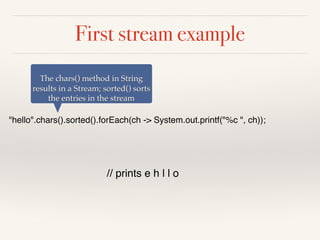
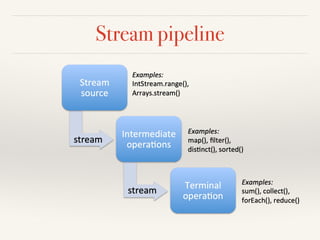
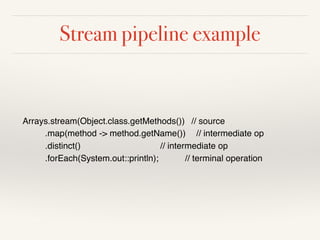
![Stream pipeline example
Method[] objectMethods = Object.class.getMethods();
Stream<Method> objectMethodStream = Arrays.stream(objectMethods);
Stream<String> objectMethodNames = objectMethodStream.map(method -> method.getName());
Stream<String> uniqueObjectMethodNames = objectMethodNames.distinct();
uniqueObjectMethodNames.forEach(System.out::println);](https://image.slidesharecdn.com/functionalthinking-ganesh-230717025137-8a6d2d6d/85/Functional-Thinking-for-Java-Developers-presented-in-Javafest-Bengaluru-36-320.jpg)
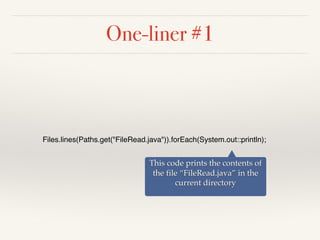
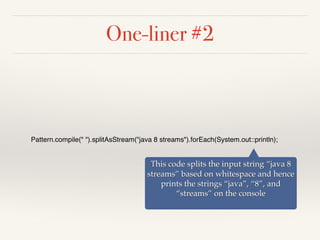
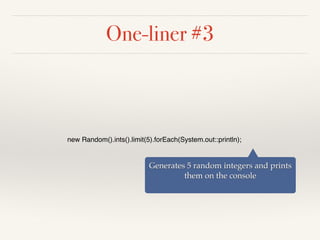
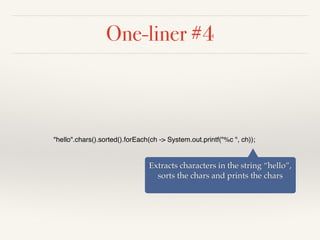
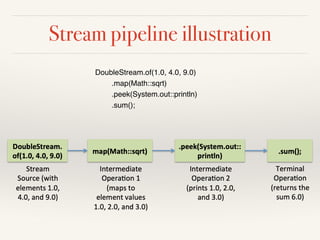
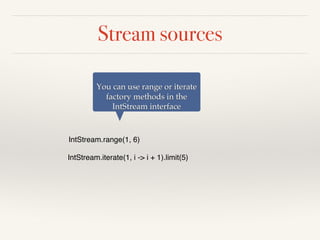
![Stream sources
Arrays.stream(new int[] {1, 2, 3, 4, 5})
Arrays.stream(new Integer[] {1, 2, 3, 4, 5})
You can use the stream() method in
java.util.Arrays class to create a
stream from a given array](https://image.slidesharecdn.com/functionalthinking-ganesh-230717025137-8a6d2d6d/85/Functional-Thinking-for-Java-Developers-presented-in-Javafest-Bengaluru-43-320.jpg)
![Stream sources
Stream.of(1, 2, 3, 4, 5)
Stream.of(new Integer[]{1, 2, 3, 4, 5})
We can also create streams using factories
and builders (e..g, of() and build() methods
in the Stream interface)
Stream.builder().add(1).add(2).add(3).add(4).add(5).build()](https://image.slidesharecdn.com/functionalthinking-ganesh-230717025137-8a6d2d6d/85/Functional-Thinking-for-Java-Developers-presented-in-Javafest-Bengaluru-44-320.jpg)
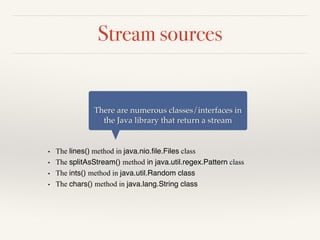
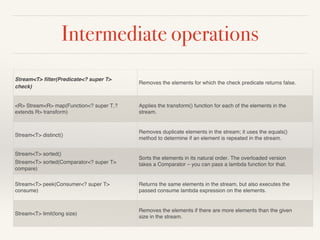
![Terminal operations
void forEach(Consumer<?
super T> action)
Calls the action for every element in the
stream.
Object[] toArray()
Returns an Object array that has the elements
in the stream.
Optional<T> min(Comparator<?
super T> compare)
Returns the minimum value in the stream
(compares the objects using the given
compare function).
Optional<T>
max(Comparator<? super T>
compare)
Returns the maximum value in the stream
(compares the objects using the given
compare function).
long count() Returns the number of elements in the stream.](https://image.slidesharecdn.com/functionalthinking-ganesh-230717025137-8a6d2d6d/85/Functional-Thinking-for-Java-Developers-presented-in-Javafest-Bengaluru-47-320.jpg)
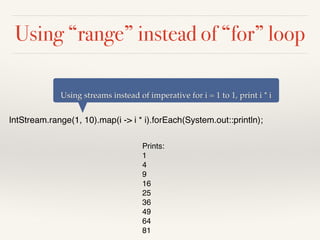
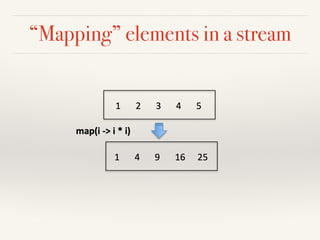
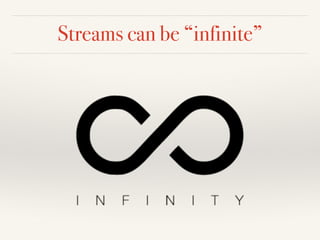
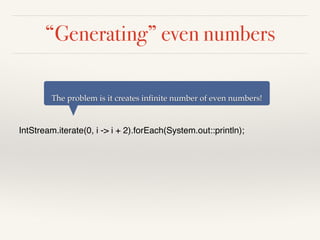
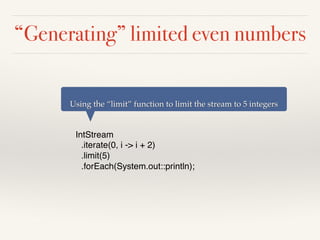
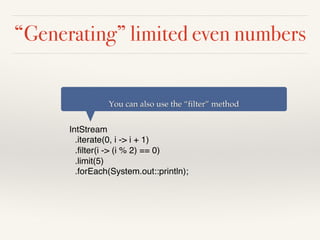
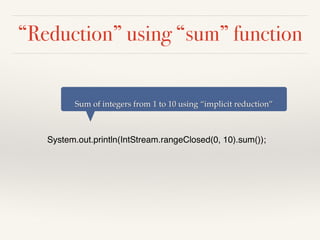
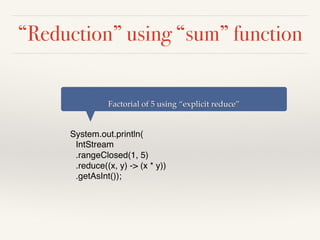
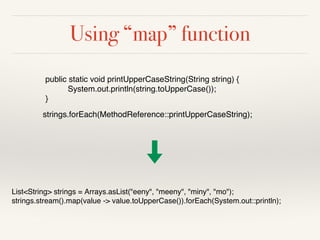
![Using “collect” function
String boxedString =
Arrays
.asList("eeny", "meeny", "miny", "mo")
.stream()
.collect(Collectors.joining(“ ,", "[", "]"));
System.out.println(boxedString);
Prints: [eeny, meeny, miny, mo]](https://image.slidesharecdn.com/functionalthinking-ganesh-230717025137-8a6d2d6d/85/Functional-Thinking-for-Java-Developers-presented-in-Javafest-Bengaluru-57-320.jpg)
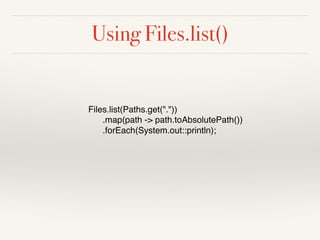
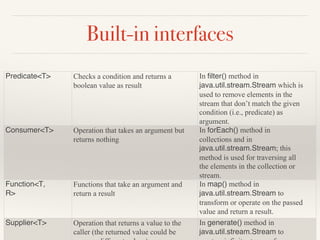
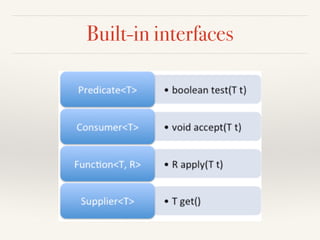


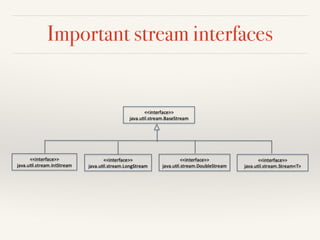
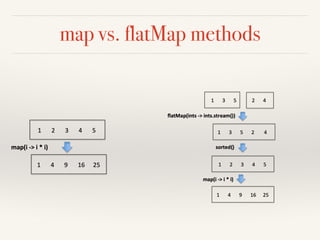
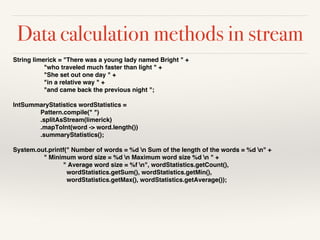
![Final (longer) example
import java.util.stream.*;
import java.nio.file.*;
import java.util.*;
import java.nio.charset.Charset;
import java.io.IOException;
class ReadFile {
public static void main(String []args) throws IOException {
List<String> lines = Files.readAllLines(Paths.get("./Ulysses.txt"), Charset.def
Map<Integer, List<String>> wordGroups
= lines.parallelStream()
.map(line -> line.replaceAll("W", " ").split(" "))
.flatMap(Arrays::stream)
.filter(str -> str.length() > 7)
.distinct()
.sorted()
.collect(Collectors.groupingBy(String::length));
wordGroups.forEach( (count, words) -> {
System.out.printf("word(s) of length %d %n", count);
words.forEach(System.out::println); });
}
}
Lists words organised by
their length in the novel
“Ulysses.txt”](https://image.slidesharecdn.com/functionalthinking-ganesh-230717025137-8a6d2d6d/85/Functional-Thinking-for-Java-Developers-presented-in-Javafest-Bengaluru-66-320.jpg)
